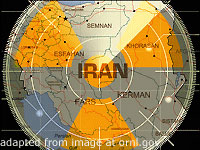RIA Novosti: Russian Experts Comment On Chance Of Dialogue Between Iran And The West

(RIA Novosti – Moscow, August 5, 2013) Under its new president Hasan Ruhani, Iran will have to make concessions to the international community over its nuclear programme, but specific results of negotiations will not become apparent any time soon, experts polled by RIA Novosti have said. Yesterday, after being officially inaugurated, President Ruhani said that the only way to interact with his country was dialogue rather than sanctions. In response, Washington said it was willing to engage in a constructive dialogue with Tehran.
It is not up to Ruhani to decide on nuclear issue
In this connection, all the experts noted the specifics of the domestic political system of Iran, in which the president ranks only second in the political hierarchy and no decision is taken without the consent of the spiritual leader and commander-in-chief Ayatollah Khamene’i.
“The expectations associated with Ruhani are more about how he manages to balance the stance of the true leader of Iran, about how Iran’s top leadership will be able to decide what concessions Tehran is ready to make,” Viktor Nadein-Ranevskiy, a senior researcher of the Russian Academy of Sciences World Economy and International Relations Institute and an expert of the Russian Council on International Affairs, thinks. “It is not up to Ruhani to decide on the issue of the Iranian nuclear programme,” he concluded.
Nevertheless, in the opinion of Vladimir Sazhin, a senior researcher at the Institute of Oriental Studies of the Russian Academy of Sciences and an expert of the Russian Council on International Affairs, Ruhani’s statement on the importance of dialogue “is not just some random propaganda slogan put forward by the new president of Iran” but the foundation of his future policy. “Ruhani’s statement is serious because the situation in and around Iran is very complicated. Practically, the country is politically isolated now. If this problem is resolved, the mission of the new president, the new government will be accomplished,” the expert said.
Leadership change does not mean automatic lifting of sanctions
Iran will soften its stance on the nuclear programme, all the experts believe. “Eventually, Iran will have to make some concessions – either restrictions or tighter controls by the IAEA on uranium enrichment and distribution of products of this enrichment,” expert Viktor Nadein-Ranevskiy said.
“We should expect a more flexible stance from Iran, but one should not hope that this will happen tomorrow or the day after tomorrow. There will be no immediate steps either from the West or Iran,” Vladimir Sazhin opined.
Nevertheless, according to the expert, the overall direction of Iran’s policy is to achieve the lifting of the sanctions.
In the opinion of another expert of the Russian Council on International Affairs, the director of the Centre for Security and Development at the Moscow State University Department of World Politics, Vladimir Bartenev, Iran will continue to defend its right to develop peaceful nuclear energy, but, since the social and economic situation in the country is deteriorating, “a certain softening of the stance of delaying some real concessions will take place”. As regards changes in the stance of the West, no easing of unilateral sanctions is to be expected simply in response to the arrival of a new leader, the expert thinks.
Lavrov’s algorithm
Speaking about the prospects of dialogue between Iran and the West, the experts expressed different opinions, but they all agreed that the process would be long. “It makes no sense to wait for the results in the very near future, but, in any case, if an atmosphere of trust is created, that would be good already,” Vladimir Sazhin thinks.
In the expert’s opinion, Russian Foreign Minister Sergey Lavrov’s step-by-step plan, which recognizes the possibility that Iran can have a civilian nuclear programme and envisages a gradual settlement of its nuclear programme, could become a good basis for negotiations.
“If an algorithm of actions is created in accordance with this plan, even without matching it perfectly, there will be hope. And Iran’s first step could be to freeze uranium enrichment up to 20 per cent,” Vladimir Sazhin said.
The expert recalled that the team of Iranian negotiators would be fully renewed, and that the Americans expressed their willingness to somehow soften their stance towards Iran. “There is a chance, the most important thing is that Ruhani and his government do not miss this chance,” the expert concluded.
Another expert, Vladimir Bartenev, not only does not expect any significant results from the talks this year, but generally doubts the effectiveness of dialogue as an instrument.
“For many years, Iran pretended very well that dialogue was under way, but we know that all sorts of red lines were crossed, the level of uranium enrichment was getting higher and higher, and I think that, from this point of view, dialogue is not the most effective method,” he said.
Vladimir Bartenev cited the example of the situation around North Korea’s nuclear programme, noting that, in that case, dialogue between the sides “produced quite short-term results, if any”. At the same time, the expert stressed that he was not calling for a military solution to the issue but only wanted to emphasize that “dialogue will be very difficult and one must not expect quick results.”
